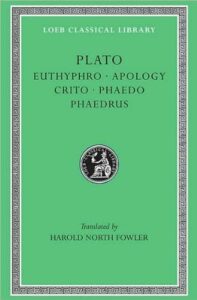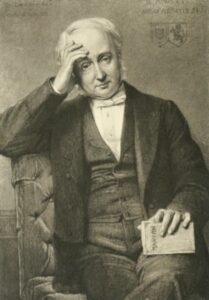 Plato’s Apology is a work I have previously read many times before I took it up once again at the beginning of 2023 as the first book in the year’s Big Read, and the charges made against Socrates by his accusers has many times struck me as poignant given my own intellectual interests. However in light of societal events over the past few years, I found the primary charge particularly so.
Plato’s Apology is a work I have previously read many times before I took it up once again at the beginning of 2023 as the first book in the year’s Big Read, and the charges made against Socrates by his accusers has many times struck me as poignant given my own intellectual interests. However in light of societal events over the past few years, I found the primary charge particularly so.
So states Socrates in his opening regarding the primary charge:
Now let us take up from the beginning the question, what the accusation is from which the false prejudice against me has arisen, in which Meletus trusted when he brought this suit against me. What did those who aroused the prejudice say to arouse it? I must, as it were, read their sworn statement as if they were plaintiffs: “Socrates is a criminal and a busybody, investigating the things beneath the earth and in the heavens and making the weaker argument stronger and teaching others these same things.” Something of that sort it is. (Apology, trans. H.W. Fowler, 19a-c)
The Greek words of interest in this passage are ἀδικεῖ καὶ περιεργάζεται. The first of these is explained in Liddell and Scott as meaning “to do wrong,” the second ” to take more pains than enough about a thing, [to] waste one’s labour on it.” Thus the passage offers an effective translation, to be sure; however even though it is perhaps less literal, I prefer the Benjamin Jowett’s translation of this same passage, “”Socrates is an evil-doer, and a curious person…” The “evil-doer” I take as rote, but the “curious person” provokes reflection.
 Now, I admit, the use by Jowett of the word “curious” could be interpreted here as “strange,” yet considering the definition of the Greek word, I appreciate that he chose “curious” as it seems better to represent the activities in which Socrates was engaged: seeking to understand the society in which he lived and the people who shared it with him. Yes, he went about bothering people – particularly those who put themselves forward as particularly knowledgeable and who charged others large sums for the opportunity to be taught by them. And yes, such public challenges (for most everything worth noting in Athenian society took place in public) to those highly placed in society – or who at least thought themselves such – by this rather forward, particularly blunt, stub-nosed man tended to put people’s own respective noses out of place. Consequently he was thought by some – particularly his accusers – to be a public nuisance, a disturber of people’s preferred methods of going about their lives, an “evil-doer.”
Now, I admit, the use by Jowett of the word “curious” could be interpreted here as “strange,” yet considering the definition of the Greek word, I appreciate that he chose “curious” as it seems better to represent the activities in which Socrates was engaged: seeking to understand the society in which he lived and the people who shared it with him. Yes, he went about bothering people – particularly those who put themselves forward as particularly knowledgeable and who charged others large sums for the opportunity to be taught by them. And yes, such public challenges (for most everything worth noting in Athenian society took place in public) to those highly placed in society – or who at least thought themselves such – by this rather forward, particularly blunt, stub-nosed man tended to put people’s own respective noses out of place. Consequently he was thought by some – particularly his accusers – to be a public nuisance, a disturber of people’s preferred methods of going about their lives, an “evil-doer.”
But it’s the “curious person” part that piques my interest. Socrates’ rejection of the assertion that he investigates “the things beneath the earth and in the heavens,” a charge also leveled at him by Aristophanes in his play The Clouds, puts the matter of early natural philosophy into the fore. There were those who pursued such studies long before Socrates was accused of doing so, Thales of Miletus for example, and one of Plato’s own students, Aristotle, would become known as one of the greatest of natural philosophers the world has ever known, but to many of the Athenians of the time, those who made such enquiries risked upsetting the understanding of the world that was believed to keep the society functioning smoothly.
It is also worth noting that Jowett himself was embroiled in charges of heresy leveled against fellow scholars and theologians, all of whom stood accused of being a “curious persons” as the result of their public questioning through a collection of very well-written essays that were published in Essays and Reviews asking why the techniques of historical enquiry that were so successfully applied to the Greek and Roman classics were not equally applied to the Bible. Adding to the similarities between Socrates and Jowett is also the fact that both were accused of disbelief in (Socrates) or questioning the established manner of understanding (Jowett) the “official god(s)” of the state.
As to Socrates’ being described as “investigating the things beneath the earth and in the heavens,” despite him denying it in his speech to the assembly and correcting them for having done so by confusing him with earlier Greek philosophers, it is worth considering what such a thing being an accusation in his society implies. It is also worth considering how Aristotle’s activities now so very long after Socrates’ own death might have been interpreted by his fellow citizens.
In the case of Socrates and his accusers, it was taught to me in university that the charges were largely known to be spurious – Socrates was a known public nuisance to a number of prominently placed people in Athens and they were more than happy to be given the opportunity to be rid of him. Let us recall that this is the same society that practiced ostracism by popular vote; indeed it’s where the word “ostracism” itself originated. However I don’t think it’s a simple as the simple working out of a popular vendetta. Socrates was a well known public figure who was not, as Aristophanes play clearly shows, particularly well respected by many.
But as to his reported investigations of the workings of nature, such a charge is not by any means unique in history. Men and women down through the ages who have engaged in such have been frowned upon, condemned, and even persecuted for such activities – one only need think of the reactions to the works of Galileo, Lyell, and Darwin to see that investigations that threaten to overturn ideas that have been well established and with which the general public is comfortable often incite hostility toward those undertaking them (just look at the present research into anthropogenic climate change for an example in our own time). People tend not to like change, regardless of what new evidence in favor of it may be brought to light.
Plus ça change, plus c’est la même chose.
